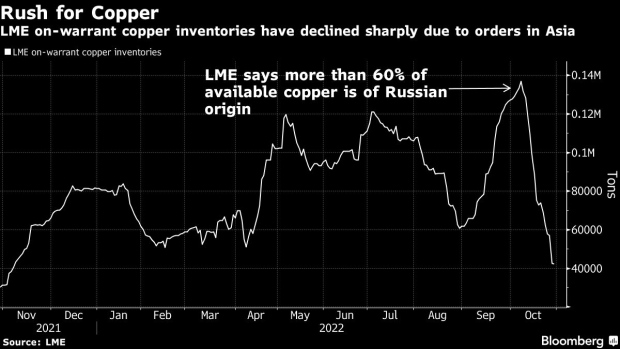Oct 29, 2022
China Shows the LME There Are Still Buyers for Russian Metal
, Bloomberg News

(Bloomberg) --
As the London Metal Exchange agonizes over what to do about supplies from Russia, some metal buyers in the biggest market for commodities have been voting with their wallets.
More than half of the copper in LME warehouses -- much of which was of Russian origin -- has been ordered out for delivery in the past three weeks, mostly by traders planning to deliver it to Chinese buyers, according to people familiar with the matter.
The metals world has been gripped for weeks by a debate over how to handle Russian metal. During a frenzied week of meetings at the industry’s annual gathering in London, the divide has only become more glaring. Several western producers actively called for restricting Russian supplies, while a group of European aluminum consumers came out forcefully against any bans.
Read: Embattled London Metal Exchange Is Headed for Another Fight
The recent copper orders are one of several signs that at least some global consumers are still happy to buy Russian metal, even as others are shunning it.
The window for the metals industry to tell the LME its views on the question of Russian metal closed on Friday, with the LME likely to publish its conclusions in the coming weeks.
“We will reflect on those views and in this way we’ll be able to say to our market, and equally importantly to ourselves, that trading on the LME truly represents the real-world behaviors of our users,” Chief Executive Matthew Chamberlain told an audience of metals industry participants at the black-tie LME dinner on Tuesday evening.
While it sought input from across the market, the stance of consumers is likely to have an outsized weighting in the LME’s decision-making about whether to take action. The exchange said in the discussion paper it published earlier this month that it was particularly keen to hear from consumers “in respect of their plans regarding accepting, or not, Russian metal moving forward.”
Traders have requested delivery of more than 70,000 tons of copper from LME warehouses in the past three weeks. Much of that is destined for consumers in China, where premiums for physical copper have risen to the highest in years, and some of it is Russian, according to people with direct knowledge of the matter, who asked not to be identified discussing private information. One trader said that their Chinese customers didn’t care whether the copper they bought was Russian in origin.
The LME previously published data showing that as much as 80% of the copper in its warehouse network in recent months was of Russian origin. A spokesperson for the LME declined to comment.
The jump in orders for copper is likely to underscore concerns that banning Russian supplies could exacerbate acute shortages seen in some metals markets. The amount of readily available copper in LME warehouses has now fallen to 42,300 tons, nearing a multiyear low seen last year during a historic supply squeeze in the copper market.
Still, the fact that Chinese consumers are still buying Russian copper is unlikely, by itself, to sway the debate decisively.
Other copper buyers in Europe have reiterated their desire to avoid buying from Russia: “We are going to meet all our commitments in metal supply in the next calendar year and thereafter without Russian cathodes,” Aurubis AG Chief Executive Officer Roland Harings said in an interview in London. “In the case of copper, there’s no need for Europe to take Russian metal.”
Vital Threat
A group of European aluminum consumers also spoke out against action by the LME this week, with German and Italian business associations putting their names to a statement warning that a ban, or any government-imposed sanctions or tariffs, were an “imminent and vital threat” to the European aluminum industry.
Meanwhile, at least one big player in the metals industry indicated it would support the LME whichever course of action the exchange takes.
“It’s very important to make sure that markets continue to operate without distortions, in a way where we can make sure there will be transparency,” said Maximo Pacheco, chairman of top copper producer Codelco. “We are confident that the LME will make a final decision on this --- and we will support it.”
The decision may yet be taken out of the LME’s hands. The US has been examining options to impose tariffs or sanctions on Russian aluminum, Bloomberg reported earlier this month, which may force the LME into action.
“Our overriding preference is for decisions of this nature to be made by democratically elected governments,” Chamberlain said at the LME dinner. “The LME’s role then can be to act rapidly once specific sanctions are imposed, as indeed we’ve already done on several occasions.”
©2022 Bloomberg L.P.






